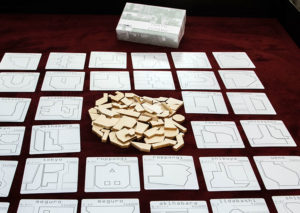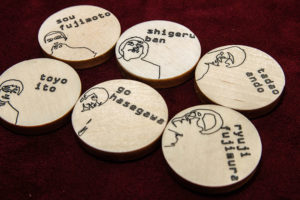 Jordan Draper Games has released a trio of Tokyo based games, each very different from one another, but relating in some way to life and culture in Tokyo, Japan.
Jordan Draper Games has released a trio of Tokyo based games, each very different from one another, but relating in some way to life and culture in Tokyo, Japan.
Today we are looking at Tokyo Jutaku, a real time dexterity game for 1-8 players. Players take on the role of Japanese architects building homes on uniquely shaped or incredibly small plots of land. It plays somewhere between 10-30 minutes, increasingly in play time as you add players. Let’s take a look at how it—umm—stacks up.
Gameplay Overview:
In Tokyo Jutaku, players take the role of architects trying to complete buildings in a very limited area while still meeting requirements for height and number of pieces. Players will all build simultaneously and the fastest player will get to score their site cards.
The site cards are laid out in a 6-by-6 grid, with the middle four cards removed to make room for the wooden pieces used to build the structures. Players will each choose a site to build, take that card and put their player marker in the vacated space.

Each site card has one or more areas defined with a darkened outline. All pieces of the structure must be placed within this border. If a card has multiple areas, the architect is free to choose one to build on. Each site card has three other pieces of important information: the number of pieces you must use, the number of levels required, and the value of the completed card.
When building, players can only place one piece at a time. If you wish to move an already played piece, you must first return the current one to the main pile and then you can adjust one placed previously. You must always place pieces so that they share a common edge with an existing piece and new levels cannot overhang or cover gaps of any kind.
If you meet the exact requirements for your site before the other players you get to score that value. You then choose a new site card, but must choose one within two spaces of your player disc. Each other player can choose to keep their existing card—but empty it of all it’s pieces—or return it and also move up to two spaces for a new site. The game ends when someone has completed their fourth site and the player with the highest total site values is the winner.

Game Experience:
Dexterity games for me are traditionally pretty hit or miss. They are generally difficult for me to get to the table regularly and sometimes wear out their welcome long before they are over. The ones that I find myself drawn to are games with low rules overhead that play quickly and Tokyo Jutaku definitely meets those requirements. But to call it a dexterity game is somewhat misguided as it’s more about finding the right pieces for your site rather than the manual ability to stack them.

The real time element is really what sets Tokyo Jutaku apart from the crowd. Players have to build quickly as you are racing against everyone at the table. There isn’t much to worry about in terms of knocking things over like is often present in many stacking games. Instead, the key is to quickly identify the best pieces available that will fit in your uniquely shaped site and help you meet the demands for your particular card. Grabbing a piece only to test fit it and then have to put it back is where time is lost. Worse yet, if you end up finding that a previously placed piece is causing problems you have to back track considerably, putting back your current piece and the offending one before you can start building again. Although you can’t be too sloppy as the pieces are quite small and you have to make sure you things fit together nicely.
The laser cut wooden pieces come in a variety of shapes and sizes, although they basically range from small to very small. There is quite a variety of angled pieces that sometimes fit nicely between other pieces and other times create problems if they don’t quite fit into your site correctly. The production is really nice, although I do wish the box was slightly larger as you have to very carefully pack the game away if you want the box to close tighly.

If you lose a round, the choice to keep your card or move onto a different one presents some interesting decisions. You have to start over, regardless, so you don’t really get a head start. But after trying once already you may have identified a good plan of attack or some certain pieces that work well on that site. They will all get mixed in the pile, but knowing what you are looking for can definitely give you a leg up. This is interesting as it’s very difficult for someone to win multiple rounds in a row as they have to start with a fresh building site.
The sites are also two sided. One side presents an easier challenge with a grid background to help players build a bit easier. They are worth less when completed, however, they are often a bit too easy if some players are using the hard side they may not be able to move quicker than someone playing the easy variety. It’s a good way to maybe balance the game if you are playing with younger players, but generally I’d suggest everyone staying on the same difficulty.
Despite the game ending when the fourth site is finished, that player isn’t necessarily guaranteed to be the winner. Values for site have a range from 8,000 yen to as much at 18,000 yen on the difficult side. So if someone completes a one or two of the most difficult sites they can pull out the win even though they didn’t win four rounds.
Final Thoughts:
Tokyo Jutaku is a wonderfully produced game that feels different enough from everything else to be worthy of your attention. The wooden pieces, combined with the stark black and white site cards, look neat on the table and will definitely grab the attention of gamers.
Tokyo Jutaku is really about your spatial awareness and ability to master identifying geometric shapes that will fit together. It scales from 1-8 players and even at the full player count will only take about 30 minutes. It’s both a good filler or party game for a crowd.
Final Score: 4 Stars – A real time stacking game with a strong focus on spatial awareness rather than dexterity.
 Hits:
Hits:
• A different take on speed and dexterity that is more about identification.
• Plays up to 8 players without overstaying its welcome.
• Beautifully produced wooden pieces
Misses:
• Box is slightly too small for all the bits to easily fit.
• Easy difficulty side doesn’t mix well with the normal difficulty cards.






















